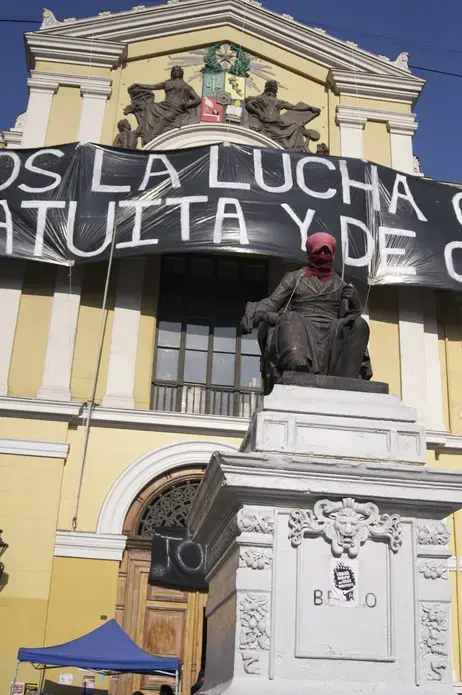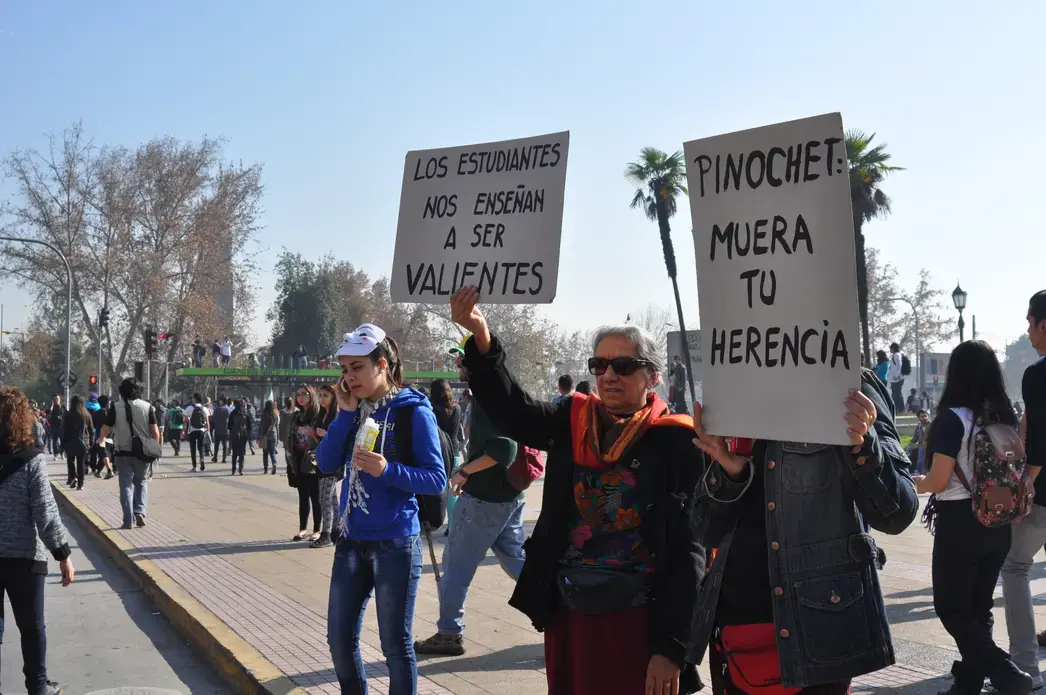Once considered a bipartisan movement, Chile's student leaders and protesters are now finding themselves in the thick of upcoming presidential elections squarely on the side of the left.
Dominique Moller, 24, a prominent student leader, worries that the state will respond with repressive practices that show a dangerous similarity to those used during the Pinochet dictatorship. She is calling on various left wing organizations to join the movement ahead of the November elections.
"A participatory democracy must create spaces in which people make decisions on matters affecting them, either through representatives or directly. Mark the option to vote with the Constituent Assembly (CA) — that's fine — and I agree with the idea of a new constitution. However I worry that this initiative results in hegemonies and undermines the Coalition [Chile's multi-party political system]," Moller said. "It is of little use to have free education if it's still on the market model."
Leaders of the education movement acknowledge the gap between policy and society, noting that political parties stray away from the daily interests of the community. Their new social movement is critical of the way President Sebastian Piñera has governed, although it hasn't been able to generate a political alternative.
Views on what to do at this point are still divided. The Communist party and its youth wing believe that institutions need to be reformed from within. Others think the political system is incorrigible, and that it must be changed through a democratic breakdown that would allow the majority to exercise their political and social rights. Hernán Gonzalez, a party member, says, "It's not Pinochet we are fighting against – he is the past. It is the presidents' policies and laws that have followed in the years since. It's the things that these presidents in the last thirty years have perfected and protected since 1981."
Patricio Salamanca, secretary general of the Federation of Students at Universidad Alberto Hurtado, agrees that just changing the laws will not fix Chile's deficient education system.
"In the end, yes, the marches are important to initiate conversations within students and the government but it's so complicated — we have a societal problem in Chile," he said.
"The student movement believes that traditional capitalist politicians act to benefit the few and not to solve the problems of the many," he continued. "By saying this we mean that the inequality continues to favor a social minority group that controls the economy, finances, and becomes richer thanks to the work of all."
The social movement complains that their demands are co-opted by the Coalition.
According to Moller, "the underlying problem is that there isn't an ability to articulate an alternative to the various political and social movements behind a social program raised by workers, students, residents and other social movements with a capitalist perspective."
Since the demonstrations of 2011, the students have established alliances with other social and labor organizations in Chile. In the student march that took place on June 26, 2013, over 100,000 Chileans — students, teachers, fishing dock workers, copper miners, health care advocates — took to the streets to march for human rights.
"The student movement is very dynamic, but also is cyclical; it rises very fast and also decreases just as quickly its activity. The labor movement is more stable and contains longer term projects," Moller said. "Another complicating factor is that coordination residents, workers, indigenous and environmentalists have different agendas."
Chileans who are demanding a free, quality education agree that the only way forward is to unify the different sectors that make up the society.
This may start to happen: The Concentration of Union Workers (CUT, the largest workers' union in Santiago) has called for a national strike on July 11, 2013. Students have announced that they will be active participants.
Another factor in Chile's education problems is the inequality that persists in different regions of Chile. There are 15 regions in Chile, and as Ignacia Fernández, investigator at the Center for Latin-American Rural Inequality, explained, " When it comes to speaking about inequality in the opportunity of a quality education, the most fundamental problem is connected to territory in Chile. One does not have the same opportunities in Chile depending on where you were born or where you live, because the opportunities one will have if you live in the metropolitan region of Santiago, for example, are completely different from those one will have in Puerto Montt or in a northern region."
Fabian Araneda, vice president of the Federation of Students at the Universidad de Chile, agrees: "We must move towards decentralization, shifting resources and political power to regional governments elected by the people. The problems experienced in Magallanes, Aysen or Arica, are not related to what happens in the central zone of Chile. There are senators and other government officials who are appointing people who do not even know the districts or constituencies, which they aspire to represent."
According to economic studies Chile would reach full development by 2016, although only four regions would exceed the $20,000 per capita, a figure that worries Chileans.
The Araucanía, a region situated in southern Chile where the Mapuche indigenous people reside, currently has the lowest income, healthcare ranking, and educational standards. "There is in this people a deep sense of autonomy. Despite living in the same territory, we are different," Aranada said. The Mapuche, like others, feel under-represented in the decisions of the state.
"Chile is not governed only by the right or the Coalition. The policy ultimately is not in La Moneda, but lies in transnational spaces or informal meetings between a few families that [control] most of the wealth," said Salamanca, the activist from Universidad Alberto Hurtado. In his view, the country is governed by the wealthiest members of society – only an anti-capitalist movement can reform the educational system.










